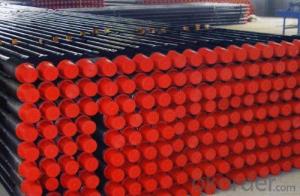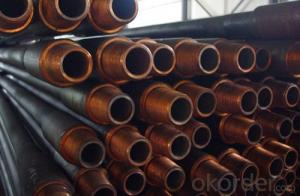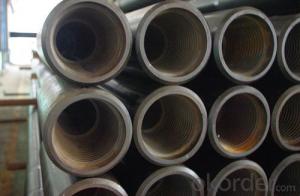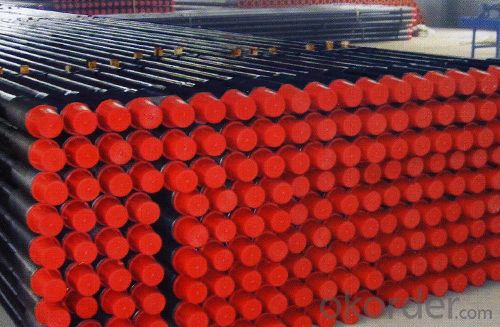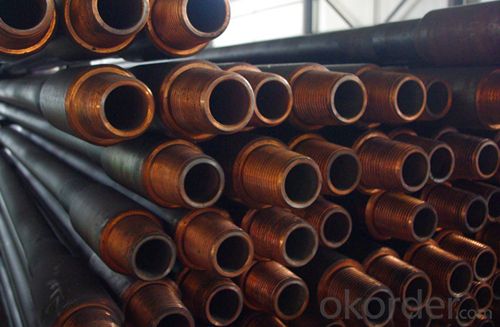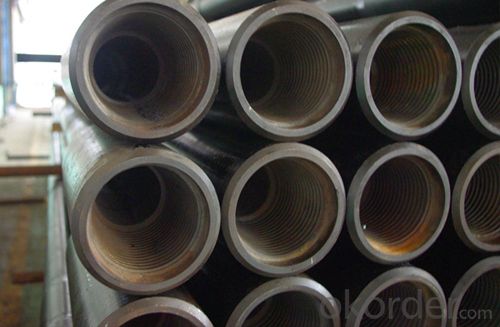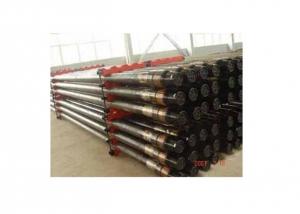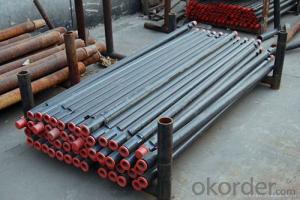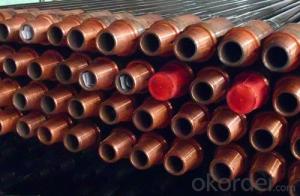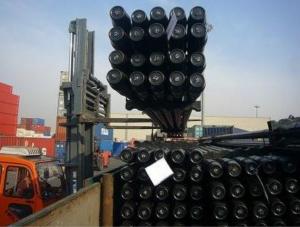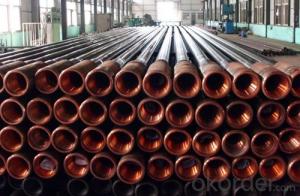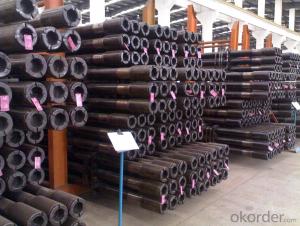Geological Drill Pipe with API Spec 5DP Standard
- Loading Port:
- Tianjin
- Payment Terms:
- TT OR LC
- Min Order Qty:
- 1 m.t.
- Supply Capability:
- 1000 m.t./month
OKorder Service Pledge
OKorder Financial Service
You Might Also Like
1. Structure of Geological Drill Pipe Description
We can supply all kinds of drill pipes that are consistent with API SPEC 5DP. Advanced drill pipe production lines can transfer the welding parameters to the best position to ensure the quality of welding zone; the heat treatment process with the feature of internal and external cooling at the same time can make a more reliable and stable mechanical character. Application of automatic weight, length measurement and automatic spray records can ensure products' traceability. Application of thickening and heating lines and 1250 tons of upsetting machine can ensure the thickening size meet the standard of API SPEC 5DR Using of CN furnace for whole pipe body heating and quenching, tempering machine's advanced heat treatment process can ensure the pipe's mechanical character. Tube hydraulic straightening machine ensures the straightness and coaxiality of pipe body.
Geological drill pipe is applicable for geographical, hydrographical, coal mining, terrestrial heat and engineering drilling. The major technical indexes of these seamless steel pipes are in compliance with international standard strictly.
The pipe materials for geographic drills have strict demands in term of sizes, forms, weights, technical specifications, test methods, test regulations, packing, marking and quality certificates. The seamless steel pipes used for geographic drills, which are produced by our company all adopt the original ex-factory identifications. If the contract says that goods should be delivered in terms of steel grades, then the identifications and quality certificates of the steel pipes should be indicated with steel grades.
2. Main Features of Geological Drill Pipe
1) Advanced test for quality
2) MTC provided
3) API Standard
3. Geological Drill Pipe Images
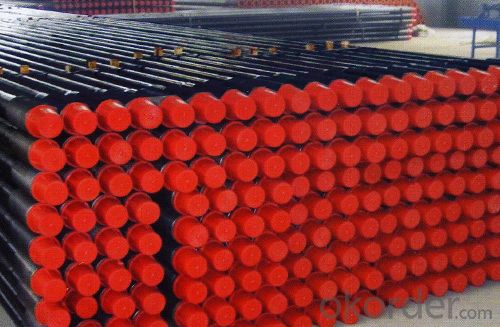
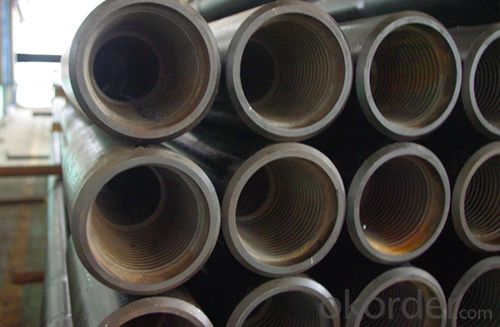
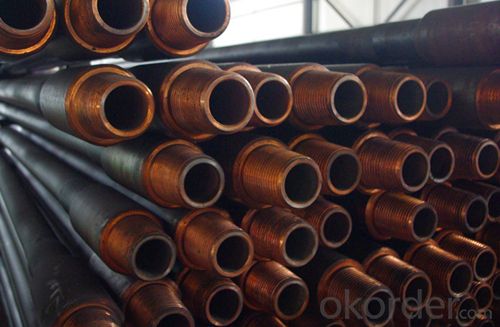
4. Geological Drill Pipe Specification
The main products include: Φ42, Φ50, Φ60, Φ63.5. The steel grades of drill pipes currently on the market are DZ40, DZ50, DZ60 and R780.
5. FAQ of Geological Drill Pipe
We have organized several common questions for our clients,may help you sincerely:
①How about your company?
One of the leading manufacturers and suppliers specializing in drill pipe products in China, mainly offering drill pipes including oil drill pipe, water well drill pipe, flat drill pipe, geological drill pipe and non-dig drill pipe.
Other than drill pipes we are also capable of supplying a wide variety of pipeline accessories, drill joints, steel pipe fittings, valves etc. consists of our one-stop sales. The integrated sales & service ensures customers with various demands an easier access for purchasing management.
②How to guarantee the quality of the products?
We have established the international advanced quality management system,every link from raw material to final product we have strict quality test;We resolutely put an end to unqualified products flowing into the market. At the same time, we will provide necessary follow-up service assurance.
③How long can we receive the product after purchase?
In the purchase of product within three working days, We will arrange the factory delivery as soon as possible.
- Q: What is the role of steel pipes in the construction of stadiums?
- Steel pipes play a crucial role in the construction of stadiums as they are used for various purposes such as structural support, drainage systems, and the distribution of utilities like water and electricity. These pipes provide a sturdy and durable framework, allowing for the construction of large and complex structures. They also facilitate efficient and reliable management of essential services, ensuring the smooth operation of stadiums during events.
- Q: How to make the magnetic steel, can be like a magnet?
- Magnetization. Winding the insulated wire on the object, passing in the direct current, and taking it down after a period of time.
- Q: How are steel pipes used in the construction of natural gas power plants?
- Steel pipes are used in the construction of natural gas power plants for various purposes, including transporting and distributing the natural gas. These pipes are used to connect the gas supply to different components of the power plant, such as turbines, boilers, and generators, ensuring a reliable and efficient flow of gas throughout the facility. Additionally, steel pipes are also used in the construction of the power plant's infrastructure, such as the cooling systems, exhaust systems, and other equipment that require durable and corrosion-resistant materials.
- Q: How do steel pipes handle vibrations?
- Steel pipes are known for their ability to handle vibrations effectively. Due to their strong and rigid nature, steel pipes can withstand various types of vibrations, including mechanical vibrations and seismic activities. The resilience of steel pipes is attributed to their structural integrity and strength. Steel pipes have high tensile strength, which enables them to resist deformation or breakage when subjected to vibrations. They are also resistant to fatigue, meaning they can endure repeated vibrations without experiencing any significant damage. This makes steel pipes ideal for applications that involve constant or cyclic vibrations, such as in industrial settings or for transportation of fluids through pipelines. Moreover, steel pipes have the advantage of being able to dampen vibrations due to their mass. The weight of the steel pipe helps absorb and dissipate the energy produced by vibrations, preventing excessive movement or oscillation. This damping effect contributes to the overall stability and durability of the pipe system. To further enhance the ability of steel pipes to handle vibrations, various measures can be taken. These may include the use of vibration isolators or dampers, which are devices designed to reduce the transmission of vibrations from the surrounding environment. Additionally, proper installation techniques and regular maintenance can help ensure that steel pipes continue to perform optimally under vibration-prone conditions. In summary, steel pipes are well-suited to handle vibrations due to their strength, resistance to fatigue, and ability to dampen vibrations. Their robustness and durability make them a reliable choice for applications where vibrations are a concern, ensuring the safe and efficient transport of fluids or materials.
- Q: How are steel pipes affected by international trade policies?
- Steel pipes can be significantly impacted by international trade policies. These policies can include tariffs, quotas, and other trade barriers that affect the import and export of steel pipes. Changes in trade policies can lead to fluctuations in prices, supply, and demand for steel pipes. Additionally, trade policies can also influence the competitiveness of domestic steel pipe producers in the global market.
- Q: How are steel pipes used in the construction of stadiums?
- Steel pipes are used in the construction of stadiums for various purposes such as structural support, plumbing, and drainage systems. They are commonly used to create the framework and support structures for the stadium's roof, stands, and other architectural elements. Additionally, steel pipes are also utilized in the installation of plumbing systems for supplying water and gas, as well as for drainage systems to manage wastewater and rainwater. Overall, steel pipes play a crucial role in providing strength, durability, and functionality to stadiums during their construction.
- Q: Can steel pipes be used for irrigation systems?
- Yes, steel pipes can be used for irrigation systems. They are strong, durable, and resistant to corrosion, making them suitable for transporting water and withstanding outdoor conditions. However, it is important to ensure proper insulation and maintenance to prevent any potential rust or degradation.
- Q: How are steel pipes used in the telecommunications sector?
- Steel pipes are commonly used in the telecommunications sector for various purposes. Firstly, steel pipes are used as conduit for underground cable installations. These pipes provide protection and support to the fiber optic cables that carry data and voice signals across long distances. The sturdy nature of steel pipes ensures that the cables remain safe from external factors such as moisture, rodents, and accidental damage. Additionally, steel pipes are used in the construction of telecommunication towers and masts. These structures require a strong and durable material to support the weight of antennas, transmitters, and other equipment. Steel pipes, with their high tensile strength and resistance to harsh weather conditions, are ideal for this purpose. Moreover, steel pipes are used for the installation of overhead communication lines. These lines are often suspended between poles or towers, and steel pipes are used as supports or brackets to hold the cables in place. The corrosion-resistant properties of steel make it a reliable choice for outdoor installations that are exposed to the elements. In summary, steel pipes play a crucial role in the telecommunications sector by providing protection, support, and durability to cable installations, tower constructions, and overhead communication lines. Their strength and resistance to environmental factors make them an essential component in building and maintaining reliable telecommunications networks.
- Q: What are the different types of steel pipe fittings for plumbing systems?
- There are several different types of steel pipe fittings for plumbing systems, including elbows, tees, couplings, unions, reducers, and flanges.
- Q: How do steel pipes handle water hammer?
- Steel pipes handle water hammer by absorbing the sudden pressure surges caused by rapid changes in water flow. The inherent strength and rigidity of steel pipes allow them to withstand the impact of water hammer without experiencing significant damage or failure.
Send your message to us
Geological Drill Pipe with API Spec 5DP Standard
- Loading Port:
- Tianjin
- Payment Terms:
- TT OR LC
- Min Order Qty:
- 1 m.t.
- Supply Capability:
- 1000 m.t./month
OKorder Service Pledge
OKorder Financial Service
Similar products
Hot products
Hot Searches
Related keywords
